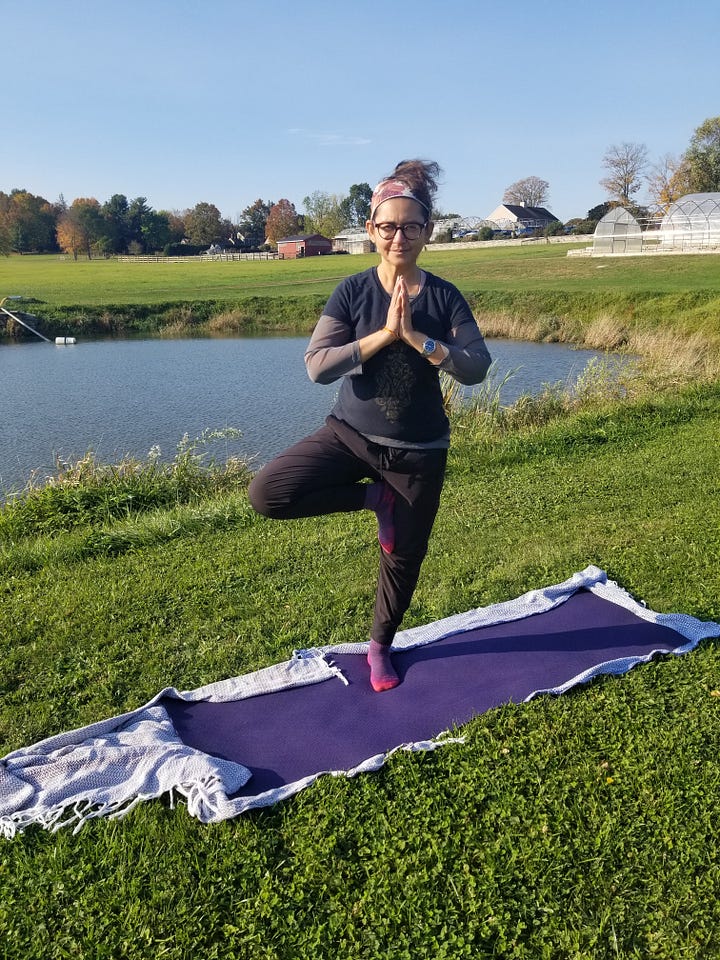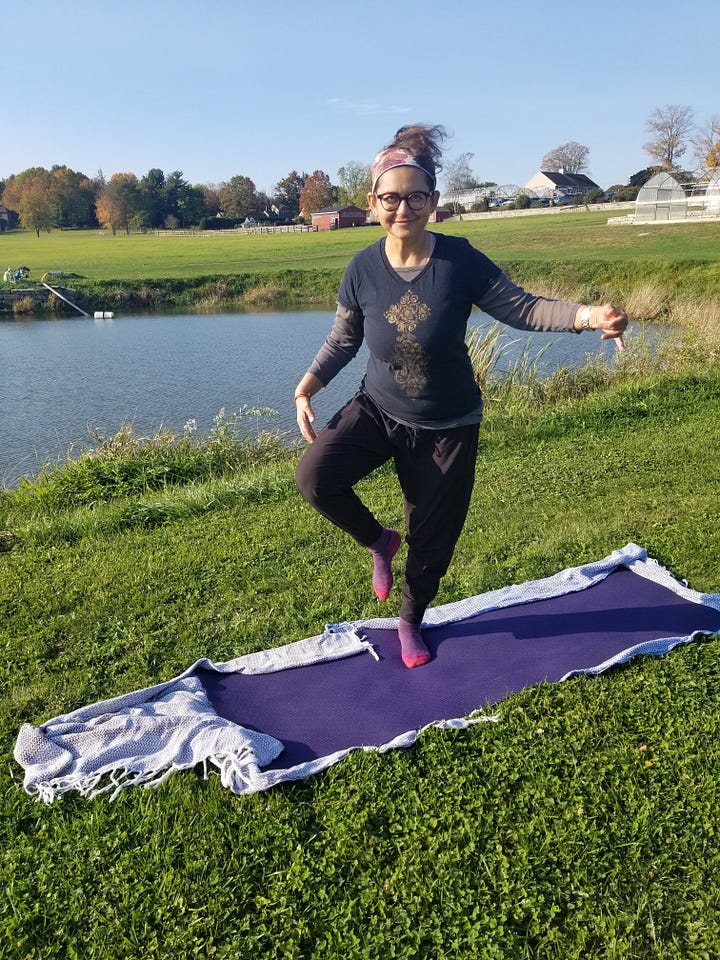Why Understanding Intentions vs. Goals Is the Key to Being Mindful in Your Busy Life
Sama Life Letters 1: Breaking Free from Autopilot When It Matters
Welcome to Sama Life Letters, where we explore the patterns that keep us stuck and the skills that set us free. If you're a changemaker—in your own life, family, community, or organization—this is for you. For us.
Imagine This...
You walk into a team meeting committed to really listening to everyone's ideas. You value collaboration. You believe in psychological safety.
Fifteen minutes in, you've interrupted twice and pushed your agenda.
You promised yourself you'd be present with your partner tonight. No phones. Real connection.
By 8 PM, you're both scrolling in silence on the couch.
You wake up determined to be patient with your teenager today. You've read the parenting books. You know they're going through a lot.
Twenty minutes later, you're yelling about the unmade bed.
Sound familiar?
We may genuinely care about our partners, kids, colleagues, and community. We want these relationships to thrive.
But here's what actually happens: Someone says something, a familiar situation arises, and boom—our brain fires up neural pathways carved years ago. Maybe we snap like our father did. Maybe we withdraw like we learned to as a child. Maybe we people-please like we've done since middle school.
These automatic responses? They're not coming from who we are now or what we value today. They're old programs running on repeat. And most of us have never actually sat down to ask: Who do I want to be in this relationship? How do I want to show up when things get tough?
The Antidote: Understanding Intentions vs. Goals
Here's the uncomfortable truth: We run 95% of our lives on autopilot. Our brain's default mode network—that automatic pilot system—takes over, especially when we're stressed, tired, or triggered.
The antidote? Being intentional.
Our first Sama Life Circle focused on being mindful even when we’re busy. I asked participants to set an intention for our time together – not a goal. I know from experience that most people struggle with this distinction – we're so conditioned to think in terms of outcomes and achievements that the concept of an intention feels foreign or we confuse it with goals.
Here are the key differences:
Goals are what you want to GET: "Close the deal." "Get my kid to clean their room." "Win the election." Goals often entail the following:
Future-focused and achievement-oriented
Activate the stress response
Create pressure: "What if I don't make it?"
Success measured by external outcomes
Intentions are how you want to BE: My intention is to "listen with curiosity." "be patient" "be grounded." Intentions often entail the following:
Present-moment qualities, being-oriented
Activate approach motivation and growth mindset
Create possibility: "How can I embody this right now?"
Success measured by showing up authentically
But here's what makes intentions powerful: They need to be actionable.
It's not enough to say "I want to be caring." You need to know what that looks like in action across the different roles you play.
My non-negotiable intention is to show up with care. Here's what that means:
When I lead workshops: I take time to understand participants' needs and challenges, research evidence-based practices, and help them experience the benefits for themselves.
When I'm cooking: I play mantras to infuse good energy, pouring my attention and love into creating food that's both tasty and nourishing.
When I'm stressed: I pause to listen within—what needs to be nurtured? What care do I need right now?
Same intention. Different actions. Always care.
Goals pull you toward a destination. Intentions anchor you in the present.
Both matter. Goals give us direction—they tell us where we're headed.
Intentions determine how we get there - who we are and become along the way.
Why This Matters (Especially When You're Trying to Change the World)
Here's what's liberating about intentions: They give you immediate agency. You can't control whether you get the project, but you CAN choose to be curious in this conversation. You can't make your teenager listen, but you CAN show up with patience right now.
Goals often create pressure – what if I fail? What if it doesn't work? They can trigger our stress response before we even begin.
Intentions are empowering. They're always available. Even if you've been reactive all day, in THIS moment, you can choose how to be. No waiting. No prerequisites.
Just choice.
The Neuroscience Behind It: Research shows that mindfulness practices literally change your brain's default mode network. When we combine intention with attention and awareness, we're engaging executive control networks that help us respond rather than react. Studies confirm that this enhances activity in brain regions associated with conscious choice and emotional regulation, even under stress.
Your Inner Compass for Every Interaction
Before a difficult conversation, setting an intention to stay curious rather than defensive changes everything. Your mind, primed with that intention, will actually remind you mid-conversation when you're starting to armor up.
Before engaging with your kids after a long day, an intention to be present (not perfect, just present) becomes your anchor when they push your buttons.
Even in meditation, we can be “kinda mindful”. But setting an intention – to be awake, curious, kind – transforms practice from going through the motions to actually training for life.
For example, at outdoor yoga with
today, I set the intention to be grounded before the balancing poses. “I am grounded” helped me stay centered in the midst of my legs shaking, me falling out of balance, seeing others in my peripheral vision get off balance. I discovered that I can be grounded even when I am out of balance and in the middle of distractions around me. It was an effortless reminder, “I am grounded” that made all the difference in my experience of yoga.

Research shows that when our actions align with our authentic intentions (how we want to BE), everything feels more natural and sustainable. We're not forcing ourselves to achieve; we're expressing who we truly are.
A 30-Second Practice That Changes Everything
Before your next interaction – with your child, partner, colleague, or even yourself:
Pause for 30 seconds before engaging and use your breath or any other anchor to return to your present moment experience
Ask: How do I want to BE in this moment?
Choose one quality: Patient. Curious. Compassionate. Present. Grounded. Any other quality that you value. Take a few moments to feel the presence of that quality, to see how it can guide your actions.
Let that intention be your anchor. When you feel yourself drifting into old patterns, return to it.
Notice without judgment. That awareness itself is progress.
Living mindfully - in practice and everyday life - is about being intentional, which doesn’t take time. Your intention isn't separate from your daily life. It IS your life. How you show up in each moment – with your family, your colleagues, yourself – that's where real change happens.
Want to Go Deeper? My Hard-Learned Lesson
If you're curious about how this plays out in high-stakes situations, here's what I learned during my town council campaign...
I entered that race with the highest intentions – to show up mindfully even in difficult situations. I hoped that even though the town was divided in what they wanted, we could work together despite our differences. For months, I lived that intention, organizing collaborative forums for all candidates, focusing on service over self-promotion.
As pressure increased leading up to Election Day, unbeknownst to me, winning started to take precedence over being service-oriented. Anxiety began clouding my judgment. I noticed I was getting more easily triggered and reacting rather than responding intentionally.
It was then that I stopped to return to mindfulness. When I observed what I was feeling and the thoughts underlying my anxiety, I saw myself thinking—I don't want to lose. . . . I have invested so much time and energy into the campaign; I have to win!
Thankfully, by pausing to reflect on my reactivity before making important decisions for the future, I got back on track. I realigned my thinking, speech, and decisions with the intentions and values that drove me to run for town council in the first place.
The Beautiful Paradox: When We Let Go of Wanting to Win, We've Already Won
Here's what happened when I returned to my intentions: I trusted that if I showed up authentically and collaboratively, giving residents opportunities to get to know all the candidates—not just me—they would choose what was best for our first town council in Amherst.
I won with the most votes.
But here's what I discovered: Even if I hadn't won, I would have already succeeded in what mattered most—being the change I wanted to see in our town. I believed genuine compassion and curiosity in the community could heal the divisiveness we were experiencing.
This is the paradox of intentions: When we focus on how we want to BE rather than what we want to achieve, we often end up achieving our goals anyway. The energy is different—it's not grasping or desperate. It's grounded and authentic. People feel that. They respond to it.
But more importantly, when our intentions are clear, the outcomes become secondary. We've already "won" by showing up as the person we want to be. The external result—whether it's an election, a promotion, or the teenager finally cleaning their room—becomes a bonus, not the measure of our worth or success.
The lesson? Whether it's a political campaign or a conversation with our partners,
when we lose our intentions, we lose ourselves. But when we stay anchored in
HOW we want to be, not just WHAT we want to achieve, everything changes.
In your next interaction today, who do you intend to be?
Choose one core intention—a quality that matters to you across all areas of life. Now get specific: What does this look like in action when you're:
With your family?
At work?
Under stress?
This is how intentions become lived practice, not just nice ideas.
That's our practice. That's where transformation lives. One intentional moment at a time.
Join our next Sama Life Circle where we'll focus on developing 8 mindfulness skills that disrupt our 8 default biases. Together we'll practice setting intentions on these qualities of the mind to be skillful in everyday life. Because transformation shouldn't happen in isolation.
With appreciative joy for our practice,
Shalini





